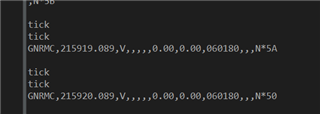Other Parts Discussed in Thread: SYSCONFIG
The echo low latency transfer example shares a way to pause your code and listen for messages on the UART buffer, and echo them back as the user types.
The echo callback code example shares a way to pause the entire code and wait for an expected message to return.
What recommendations do you have for a practical system that expects an RX messages to be received at any given time, while operating other processes. I tried adapting the callback example by removing the Semaphore pauses but it does not seem to ever trigger the read callback. I also tried to adapt the low latency transfer example but it has the issue of pausing the code to wait for a character, rather than doing something to the character when it is received in the interrupt.
On other microcontrollers I have implemented what I want here by having an ISR trigger on the UART, and in that function it simply reads the char received and does logic based on that but I still often get confused by how FreeRTOS is used here in combination with CCS's sysconfig structures. Any recommendations on settings / approach? I essentially just want an ISR to tell me what char it received without hindering the code.


